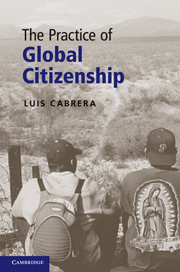Book contents
- Frontmatter
- Contents
- Preface
- Acknowledgments
- Introduction
- Part I Theoretical concerns
- 1 Global citizenship as individual cosmopolitanism
- 2 Rights, duties, and global institutions
- 3 Defining and distributing duties
- Part II Global citizenship in practice
- Part III Advocacy and institutions
- Conclusion: the practice of global citizenship
- Appendix
- Works cited
- Index
3 - Defining and distributing duties
Published online by Cambridge University Press: 05 June 2012
- Frontmatter
- Contents
- Preface
- Acknowledgments
- Introduction
- Part I Theoretical concerns
- 1 Global citizenship as individual cosmopolitanism
- 2 Rights, duties, and global institutions
- 3 Defining and distributing duties
- Part II Global citizenship in practice
- Part III Advocacy and institutions
- Conclusion: the practice of global citizenship
- Appendix
- Works cited
- Index
Summary
The discussion to this point has indicated the likely need for rights-protecting institutions of fully global scope. In the absence of some neutral global judge, own-case and related biases will continue to affect judgments about overseas distributions. They will also affect crucial judgments about fair terms of global trade and investment, loan and aid conditionalities, responsibility to address climate change, and myriad other issues with implications for rights protections. The promotion of integration between states, and the creation of broader political communities, should provide some means of challenging such biases. Over time, it could also help to mitigate biases through promoting broader perceptions of self- and communal interest. It could help to weaken the view that securing the rights of noncompatriots is a zero-sum enterprise, where any distribution beyond state borders is simply a loss of resources to one’s primary moral and political community.
I have argued elsewhere that the appropriate, long-term institutional prescription in a cosmopolitan frame could be full global political integration: a multi-level “world state” at least as deeply integrated as the current European Union, though with more robust social provision and more direct mechanisms of democratic accountability (Cabrera 2004). There, my primary concern was with the macro-level case for strong institutional cosmopolitanism. Significant attention was given to the feasibility of institutional transformation. Specifically, I considered the interest state leaders have in pursuing trade integration at the global and regional level, and ways in which that would conceivably open possibilities for forms of global political integration in the very long term (see also Rodrik 2000; 2007). Attention also was focused on desirability, or the ways in which global political institutions might be configured to answer critics’ legitimate concerns about tyranny and democratic representation.
- Type
- Chapter
- Information
- The Practice of Global Citizenship , pp. 66 - 96Publisher: Cambridge University PressPrint publication year: 2010

